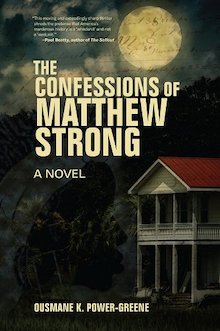
Other Press, 2022
Allegra Douglass, a professor of philosophy in New York City, is living the dream. Recently been promoted to tenure with a named chair, she has a loving partner, the respect of (most of) her colleagues, talented students, and work she enjoys. She’s also Black, and she’s traveled a long and hard road from her difficult childhood in Alabama. When Allie’s student Cynthia disappears, an FBI agent pays Allie a visit. Soon after, Allie’s apartment is ransacked by an intruder. Her beloved grandmother dies, and she is obliged to return to Alabama where she must confront her sister, who resents her success. But before she can tie up these familial loose ends, she is kidnapped by a vicious lunatic who imprisons her in a restored plantation manse.
So begins The Confessions of Matthew Strong, a propulsive thriller with a fine moral edge that unfolds, strangely enough, in the decidedly non-thrilling context of academe. Like many highly visible women in positions of power, Allie has long suffered from the unwanted attention of a stalker who, as it turns out, may be connected with Cynthia’s disappearance. This creep, named Matthew Strong, sends threatening notes about a shadowy “movement” of “men we deem true bearers of American democratic tradition.” His letters are full of references to one William Shields, a white supremacist who led a campaign of terror, killing black political leaders and their white allies in the decade after the Civil War, until he was finally caught, tried, and hanged for his crimes.
Although Shields is fictional, his monstrosity is all too familiar and real. Allie and her sister, Janice, grew up in the shadow of his crimes, which have inspired a nightmarish campaign of terror in Birmingham. Numerous Black women have gone missing, including the mother of Allie and Janice. Although their grandmother kept extensive records—maps, newspaper clippings, reports, anything that might lead to her missing daughter—nothing has helped. Sensing death approaching, Allie’s grandmother organizes a group of local women to take up the cause. After Cynthia disappears, Allie joins this group along with her sister.
Before Shields was hanged, he wrote a manifesto. After a long search, Allie’s captor discovered a copy of this document. There’s a problem: the text of the Confessions is in German, a language Strong does not know. Strong presses Allie to translate. When Allie balks, Strong reveals that he’s kidnapped not only Cynthia but an entire group of Black women, and he intends to kill one of them for each day Allie refuses. Strong presents Allie with what he calls a “choice”—to translate the repulsive document and make herself complicit in his hateful activities or allow these women to be killed. “What kind of choice is that?” she asks. He replies: “The kind you love, doc. Save yourself and the others, or hold to your principles and die a martyr.”
In this chilling moment, Power-Green confronts readers with a difficult and uncomfortable question: How far will you go in defense of your principles? Are your commitments lived or not? Before Cynthia disappeared, Allie gave her this prescient advice:. “The first thing powerful people did was squeeze you whenever they saw you were vulnerable. I should know. This is what happened to me.” How easily our principles can be separated from our beating hearts. Strong thinks he can break Allie’s spirit by forcing her to put her talents in the service of his ends, which are diametrically opposed to her own.
The novel’s most uncomfortable when it explores the intellectual and professional resonance between Allie and Strong as two people with shared interests in ideas and history. For both of them, audiences are important, and in this narrow regard, Strong’s goals are not so different from Allie’s. Like any ambitious professor, Strong wants to wield influence beyond his immediate circle; he wants to broaden his audience. Allie is acutely aware of this desire, what it means and entails. “He had already galvanized his base, and now he wanted his ideas published,” Allie says. “He wasn’t about to allow the FBI or any of his enemies to prevent his ideas from being published.”
But the life of the mind isn’t just another propagandistic pursuit; trumpeting lousy ideas isn’t the same as generating good ones. Strong tells Allie why he needs her: “You believe in truth. It’s your, what’d they call it, professional obligation to tell the truth. Ain’t that right?” And this is right, as far as it goes. Allie does have this obligation. But his rigid, simplistic and narrow conception of truth admits no complexity. His truth is nowhere near the whole truth; in fact, it is so far from the whole truth as to be a perversion of it. Unlike her captor, Allie is well prepared to cope with paradox and ambiguity, buying herself and her fellow captives time for the forces of love and justice to gather and strike. More than just another psychological thriller, The Confessions of Matthew Strong is the best sort of novel of ideas, a riveting read that asks penetrating questions about truth-telling, history, and ideological commitment.
+++
Ousmane K. Power-Green is the Program Director of Africana Studies and an Associate Professor of History at Clark University. He is also the author of Against Wind and Tide: The African American Struggle Against the Colonization Movement, and his writing appears in The Harlem Renaissance Revisited: Politics, Arts, and Letters. He’s been featured on All Things Considered, C-SPAN Book TV, and NPR’s history podcast Throughline.
+
Diane Josefowicz is books editor at Necessary Fiction. She’s also the author of a novel, Ready, Set, Oh (Flexible Press 2022) and a novella, L’Air du Temps (1985), forthcoming in 2024 from Regal House.